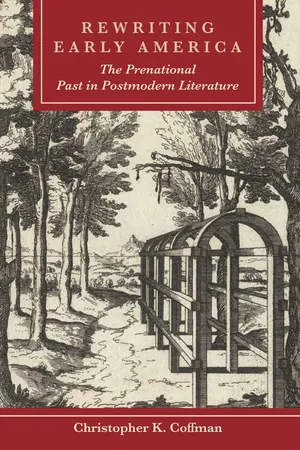
eBook - ePub
Rewriting Early America
The Prenational Past in Postmodern Literature
- English
- ePUB (mobile friendly)
- Available on iOS & Android
eBook - ePub
About this book
Recent poems and fictions set in the early Americas are typically read as affirmations of cultural norms, as evidence of the impossibility of genuine engagement with the historical past, or as contentious repudiations of received histories. Inspired particularly by Mihai Spariosu's arguments regarding literary playfulness as an opening to peace, Rewriting Early America: The Prenational Past in Postmodern Literature adopts a different perspective, with the goal of demonstrating that many recent literary texts undertake more constructive and hopeful projects with regard to the American past than critics usually recognize. While honoring writers' pervasive critiques of hegemony, this volume trades a preoccupation with antagonism for an interest in restoration and recuperation. It describes how texts by John Barth, John Berryman, Susan Howe, Toni Morrison, Paul Muldoon, Thomas Pynchon, and William T. Vollmann harness the ambiguities of the colonial past to find sociocultural possibilities that operate beyond the workings of power and outside the politics of difference. Throughout, this book remains devoted to uncovering the moments at which contemporary writers proffer visions of American communities defined not by marginalization and oppression, but by responsive understanding and inclusion.
Frequently asked questions
Yes, you can cancel anytime from the Subscription tab in your account settings on the Perlego website. Your subscription will stay active until the end of your current billing period. Learn how to cancel your subscription.
No, books cannot be downloaded as external files, such as PDFs, for use outside of Perlego. However, you can download books within the Perlego app for offline reading on mobile or tablet. Learn more here.
Perlego offers two plans: Essential and Complete
- Essential is ideal for learners and professionals who enjoy exploring a wide range of subjects. Access the Essential Library with 800,000+ trusted titles and best-sellers across business, personal growth, and the humanities. Includes unlimited reading time and Standard Read Aloud voice.
- Complete: Perfect for advanced learners and researchers needing full, unrestricted access. Unlock 1.4M+ books across hundreds of subjects, including academic and specialized titles. The Complete Plan also includes advanced features like Premium Read Aloud and Research Assistant.
We are an online textbook subscription service, where you can get access to an entire online library for less than the price of a single book per month. With over 1 million books across 1000+ topics, we’ve got you covered! Learn more here.
Look out for the read-aloud symbol on your next book to see if you can listen to it. The read-aloud tool reads text aloud for you, highlighting the text as it is being read. You can pause it, speed it up and slow it down. Learn more here.
Yes! You can use the Perlego app on both iOS or Android devices to read anytime, anywhere — even offline. Perfect for commutes or when you’re on the go.
Please note we cannot support devices running on iOS 13 and Android 7 or earlier. Learn more about using the app.
Please note we cannot support devices running on iOS 13 and Android 7 or earlier. Learn more about using the app.
Yes, you can access Rewriting Early America by Christopher K. Coffman in PDF and/or ePUB format, as well as other popular books in Literature & Modern Literary Criticism. We have over one million books available in our catalogue for you to explore.
Information
Table of contents
- Title Page
- Acknowledgments
- Introduction
- Berryman’s Bradstreet and the End(s) of New Criticism
- John Barth’s Metanarrative Critique, or History as Literature as Reenactment
- Tradition and Critique in Paul Muldoon’s “Madoc: A Mystery”
- Material Values in Pynchon and Vollmann
- The New World(s) of Thomas Pynchon
- Silence and Places beyond Power in the Poetry of Susan Howe
- Conclusion
- Bibliography
- Index
- About the Author